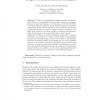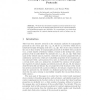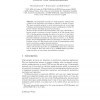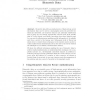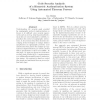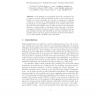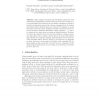124
click to vote
TCC
2005
Springer
15 years 7 months ago
2005
Springer
Abstract. We prove a computational soundness theorem for the symbolic analysis of cryptographic protocols which extends an analogous theorem of Abadi and Rogaway (J. of Cryptology ...
97
Voted
STACS
2005
Springer
15 years 7 months ago
2005
Springer
Abstract. We show that for infinite transition systems induced by cryptographic protocols in the Rusinowitch/Turuani style certain fundamental branching properties are decidable. ...
152
Voted
RTA
2005
Springer
15 years 7 months ago
2005
Springer
Cryptographic protocols are small programs which involve a high level of concurrency and which are difficult to analyze by hand. The most successful methods to verify such protocol...
128
Voted
PPDP
2005
Springer
2005
Springer
A resolution strategy for verifying cryptographic protocols with CBC encryption and blind signatures
15 years 7 months ago
Formal methods have proved to be very useful for analyzing cryptographic protocols. However, most existing techniques apply to the case of abstract encryption schemes and pairing....
121
click to vote
EUROCRYPT
2005
Springer
15 years 7 months ago
2005
Springer
Biometric data offer a potential source of high-entropy, secret information that can be used in cryptographic protocols provided two issues are addressed: (1) biometric data are n...
150
click to vote
ACSAC
2005
IEEE
15 years 8 months ago
2005
IEEE
Understanding the security goals provided by cryptographic protocol implementations is known to be difficult, since security requirements such as secrecy, integrity and authentici...
110
click to vote
TCC
2007
Springer
15 years 8 months ago
2007
Springer
Abstract. Cryptographic protocols are often designed and analyzed under some trusted set-up assumptions, namely in settings where the participants have access to global information...
RTA
2007
Springer
15 years 8 months ago
2007
Springer
In the analysis of cryptographic protocols, a treacherous set of terms is one from which an intruder can get access to what was intended to be secret, by adding on to the top of a ...
104
click to vote
LPAR
2007
Springer
15 years 8 months ago
2007
Springer
Many analysis techniques and decidability results have been obtained for cryptographic protocols. However all of them consider protocols with limited procedures for the processing ...
CRYPTO
2007
Springer
15 years 8 months ago
2007
Springer
The common random string model introduced by Blum, Feldman and Micali permits the construction of cryptographic protocols that are provably impossible to realize in the standard m...
